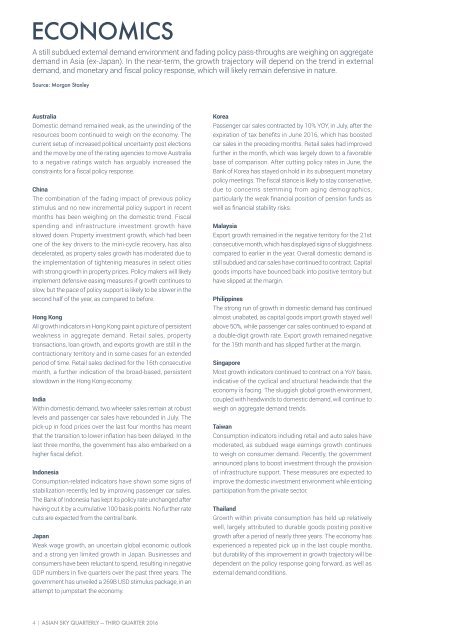h2rB3076w4f
h2rB3076w4f
h2rB3076w4f
You also want an ePaper? Increase the reach of your titles
YUMPU automatically turns print PDFs into web optimized ePapers that Google loves.
ECONOMICS<br />
A still subdued external demand environment and fading policy pass-throughs are weighing on aggregate<br />
demand in Asia (ex-Japan). In the near-term, the growth trajectory will depend on the trend in external<br />
demand, and monetary and fiscal policy response, which will likely remain defensive in nature.<br />
Source: Morgan Stanley<br />
Australia<br />
Domestic demand remained weak, as the unwinding of the<br />
resources boom continued to weigh on the economy. The<br />
current setup of increased political uncertainty post elections<br />
and the move by one of the rating agencies to move Australia<br />
to a negative ratings watch has arguably increased the<br />
constraints for a fiscal policy response.<br />
China<br />
The combination of the fading impact of previous policy<br />
stimulus and no new incremental policy support in recent<br />
months has been weighing on the domestic trend. Fiscal<br />
spending and infrastructure investment growth have<br />
slowed down. Property investment growth, which had been<br />
one of the key drivers to the mini-cycle recovery, has also<br />
decelerated, as property sales growth has moderated due to<br />
the implementation of tightening measures in select cities<br />
with strong growth in property prices. Policy makers will likely<br />
implement defensive easing measures if growth continues to<br />
slow, but the pace of policy support is likely to be slower in the<br />
second half of the year, as compared to before.<br />
Hong Kong<br />
All growth indicators in Hong Kong paint a picture of persistent<br />
weakness in aggregate demand. Retail sales, property<br />
transactions, loan growth, and exports growth are still in the<br />
contractionary territory and in some cases for an extended<br />
period of time. Retail sales declined for the 16th consecutive<br />
month, a further indication of the broad-based, persistent<br />
slowdown in the Hong Kong economy.<br />
India<br />
Within domestic demand, two wheeler sales remain at robust<br />
levels and passenger car sales have rebounded in July. The<br />
pick-up in food prices over the last four months has meant<br />
that the transition to lower inflation has been delayed. In the<br />
last three months, the government has also embarked on a<br />
higher fiscal deficit.<br />
Indonesia<br />
Consumption-related indicators have shown some signs of<br />
stabilization recently, led by improving passenger car sales.<br />
The Bank of Indonesia has kept its policy rate unchanged after<br />
having cut it by a cumulative 100 basis points. No further rate<br />
cuts are expected from the central bank.<br />
Japan<br />
Weak wage growth, an uncertain global economic outlook<br />
and a strong yen limited growth in Japan. Businesses and<br />
consumers have been reluctant to spend, resulting in negative<br />
GDP numbers in five quarters over the past three years. The<br />
government has unveiled a 269B USD stimulus package, in an<br />
attempt to jumpstart the economy.<br />
Korea<br />
Passenger car sales contracted by 10% YOY, in July, after the<br />
expiration of tax benefits in June 2016, which has boosted<br />
car sales in the preceding months. Retail sales had improved<br />
further in the month, which was largely down to a favorable<br />
base of comparison. After cutting policy rates in June, the<br />
Bank of Korea has stayed on hold in its subsequent monetary<br />
policy meetings. The fiscal stance is likely to stay conservative,<br />
due to concerns stemming from aging demographics,<br />
particularly the weak financial position of pension funds as<br />
well as financial stability risks.<br />
Malaysia<br />
Export growth remained in the negative territory for the 21st<br />
consecutive month, which has displayed signs of sluggishness<br />
compared to earlier in the year. Overall domestic demand is<br />
still subdued and car sales have continued to contract. Capital<br />
goods imports have bounced back into positive territory but<br />
have slipped at the margin.<br />
Philippines<br />
The strong run of growth in domestic demand has continued<br />
almost unabated, as capital goods import growth stayed well<br />
above 50%, while passenger car sales continued to expand at<br />
a double-digit growth rate. Export growth remained negative<br />
for the 15th month and has slipped further at the margin.<br />
Singapore<br />
Most growth indicators continued to contract on a YoY basis,<br />
indicative of the cyclical and structural headwinds that the<br />
economy is facing. The sluggish global growth environment,<br />
coupled with headwinds to domestic demand, will continue to<br />
weigh on aggregate demand trends.<br />
Taiwan<br />
Consumption indicators including retail and auto sales have<br />
moderated, as subdued wage earnings growth continues<br />
to weigh on consumer demand. Recently, the government<br />
announced plans to boost investment through the provision<br />
of infrastructure support. These measures are expected to<br />
improve the domestic investment environment while enticing<br />
participation from the private sector.<br />
Thailand<br />
Growth within private consumption has held up relatively<br />
well, largely attributed to durable goods posting positive<br />
growth after a period of nearly three years. The economy has<br />
experienced a repeated pick up in the last couple months,<br />
but durability of this improvement in growth trajectory will be<br />
dependent on the policy response going forward, as well as<br />
external demand conditions.<br />
4 | ASIAN SKY QUARTERLY — THIRD QUARTER 2016


